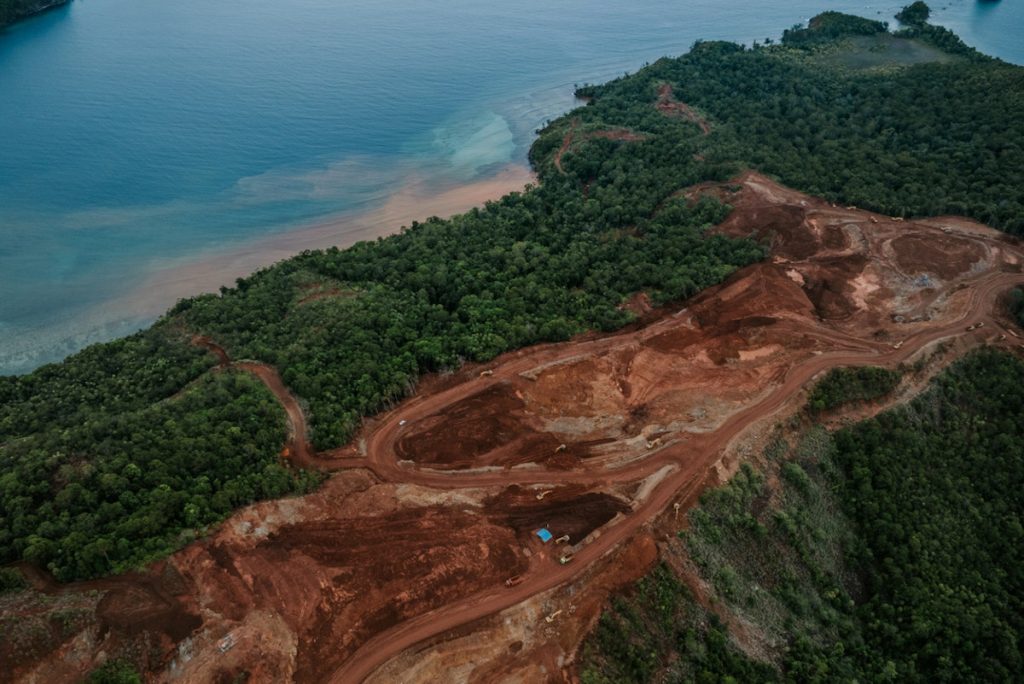
Published earlier this month, the investigation found 16 active or expired nickel mining licenses in Raja Ampat, which is a famed UNESCO Global Geopark and the world’s most biodiverse protected marine area.
It is home to 75 per cent of the world’s coral species and about 2,500 fish species, and is also a habitat for rare land-based fauna, including 47 species of mammals, of which one – the Waigeo spotted cuscus – is endemic, and 274 bird species, six of which are endemic.
The inquiry also revealed deforestation for nickel mining in the region. For example, on Manuran Island, which sits within the boundaries of the UNESCO Global Geopark and where the longest-established nickel mine in Raja Ampat is located, a mapping analysis and available data indicated that there has been 156 hectares of deforestation since mining activities began. The island only covers about 750 hectares.
The report found that nickel ore mined from Raja Ampat’s two active mines, PT Gag Nikel and PT Kawei Sejahtera Mining, could be entering the supply chains of car manufacturers such as BYD, Tesla, BMW, Nissan, and Hyundai.
“It is possible that any of these vehicle supply chains could be linked to nickel ore coming from Raja Ampat, though a lack of supply chain transparency makes this impossible to confirm at this time,” said Greenpeace in the report.
Previous reports have highlighted that the nickel mining industry risks causing another 500,000 hectares of deforestation across the entire archipelago of Indonesia.
“
As demand for electric vehicle batteries increases, we must find ways to minimise the harm caused by this transition. Automakers cannot turn away from this responsibility.
Erin Eunseo Choi, climate and energy campaigner, Greenpeace East Asia
BMW, in an email response, told Eco-Business that it does not have any direct relationships with nickel suppliers, and its supply is sourced “independently and autonomously” through battery cell manufacturers. These firms must comply with environmental standards, which also apply to mining subcontractors, the German carmaker said.
BMW is one of a few carmakers globally with a concrete, time-bound commitment to anti-deforestation in its supply chain, although its latest policy document does not mention nickel. In a comparative analysis of automaker performance in building equitable and sustainable supply chains conducted by advocacy network Lead the Charge, the car brand ranked first for climate and environment among 18 automakers, achieving a score of 60 per cent.
The report, however, said that company performance on addressing deforestation risks in the supply chains was poor overall and noticeably less advanced than the progress made by companies in other industries.
A BMW spokesperson said: “If there are any indications of possible violations in the supply chain, we clarify them and take action.”
The spokesperson added that BMW is actively engaged in efforts to develop standards for responsible nickel supply chains through voluntary standards bodies such as the Initiative for Responsible Mining Assurance (IRMA) and Responsible Minerals Initiative (RMI).
Another carmaker Nissan told Eco-Business that it was unable to confirm if it sources nickel from Raja Ampat, and that its team is still investigating the matter.
Eco-Business also approached BYD, Tesla, and Hyundai about potential nickel supply chain links to Raja Ampat. The companies have not responded at press time.
Nickel mining set to ramp up in Raja Ampat
Of the mining licences identified in Greenpeace’s Raja Ampat investigation, 10 are located within conservation areas and four are classified as “small islands” by the Indonesia government, which the NGO said indicates that all commercial mining activities there should be restricted, citing the law.
The report also found that two nickel mining licences in Raja Ampat have been reactivated or reissued this year, and three cancelled licences – mothballed in response to growing opposition from environmental groups and local communities – are being contested in the courts by mining firms.
There are also plans to build new nickel smelters in Sorong, the main arrival point for tourists into Raja Ampat, which is and itself a biodiversity hotspot.
Indonesia has the world’s largest reserves of nickel, and mines have been in operation mainly in Sulawesi since the beginning of last century. However, the destructive effects of nickel mining in Indonesia have gained global attention as demand has grown in line with rocketing EV sales, while Indonesia’s government has pursued an aggressive policy to boost domestic extraction and refining capacity.
In May, local non-profit Satya Bumi published a report documenting water pollution, reduced fish catch among the Indigenous Bajau community, and a rise in skin diseases in children living near nickel mines in Southeast Sulawesi. Greenpeace’s investigation has found evidence of similar impacts in Raja Ampat, where rain water runoff from cleared forests has smothered coral reefs.
Traceability gap
Indonesia’s booming nickel mining sector is blighted by a lack of transparency, although EV manufacturers have been under pressure to improve mineral supply chain traceability. Regulations such as the European Union’s Corporate Sustainability Due Diligence Directive (CSDDD) require firms to comply with human rights and environmental standards across their supplier networks.
Greenpeace Indonesia’s Forest Campaign Team Leader Arie Rompas told Eco-Business that EV brands are currently “outsourcing the responsibility” of ensuring nickel supply chain sustainability to stakeholders further up the value chain, which it said is “not a credible response”.
“As the Raja Ampat nickel mining case shows, there are real risks that these brands’ supply chains could be connected to the destruction of forests and marine ecosystems,” he said. “Simply ‘engaging with’ IRMA and RMI is insufficient to ensure current operations are sustainable,” he said.
Harita Nickel became only the first Indonesian nickel mining firm to commit to an IRMA audit last year.
Greenpeace called for an immediate revokation of mining licences in Raja Ampat and for supply chain actors, including battery producers, to investigate their supply chains and “clearly and publicly reject the supply of nickel and nickel ore that originates from any mines in Raja Ampat”.
Meanwhile, Indonesia’s nickel output continues to grow to meet surging demand. The country’s nickel production surged from 1.6 million tonnes in 2022 to 2.2 million tonnes in 2024, with further growth expected through 2028. A report by the Centre for Research on Energy and Clean Air, found that of the 117 captive coal-fired power plants operating in Indonesia, the majority power the nickel industry.








